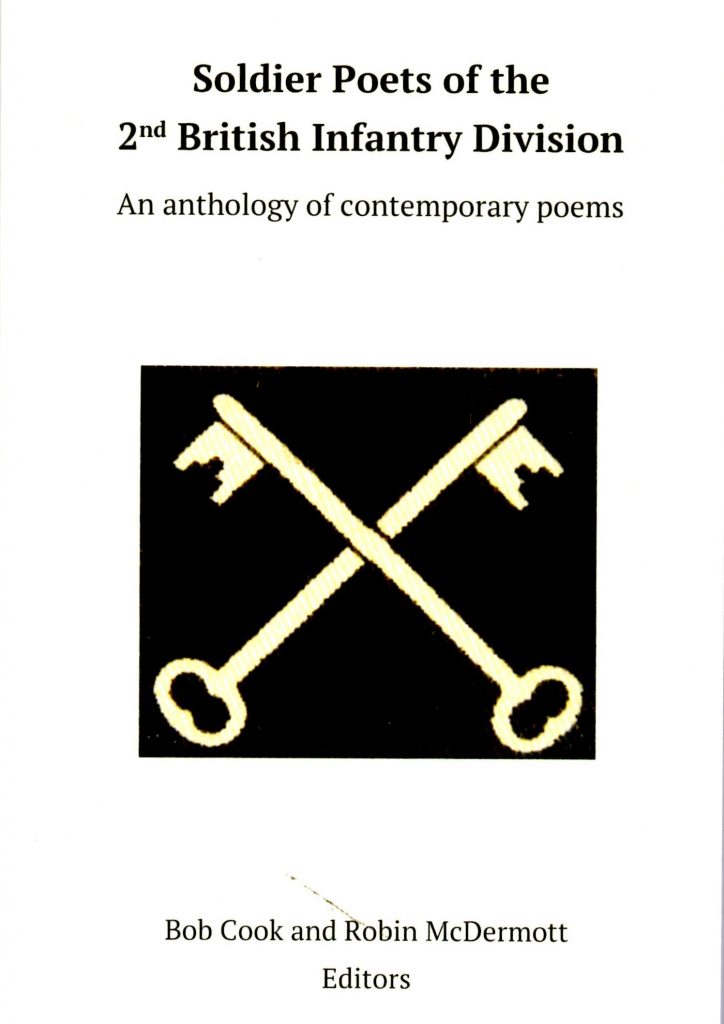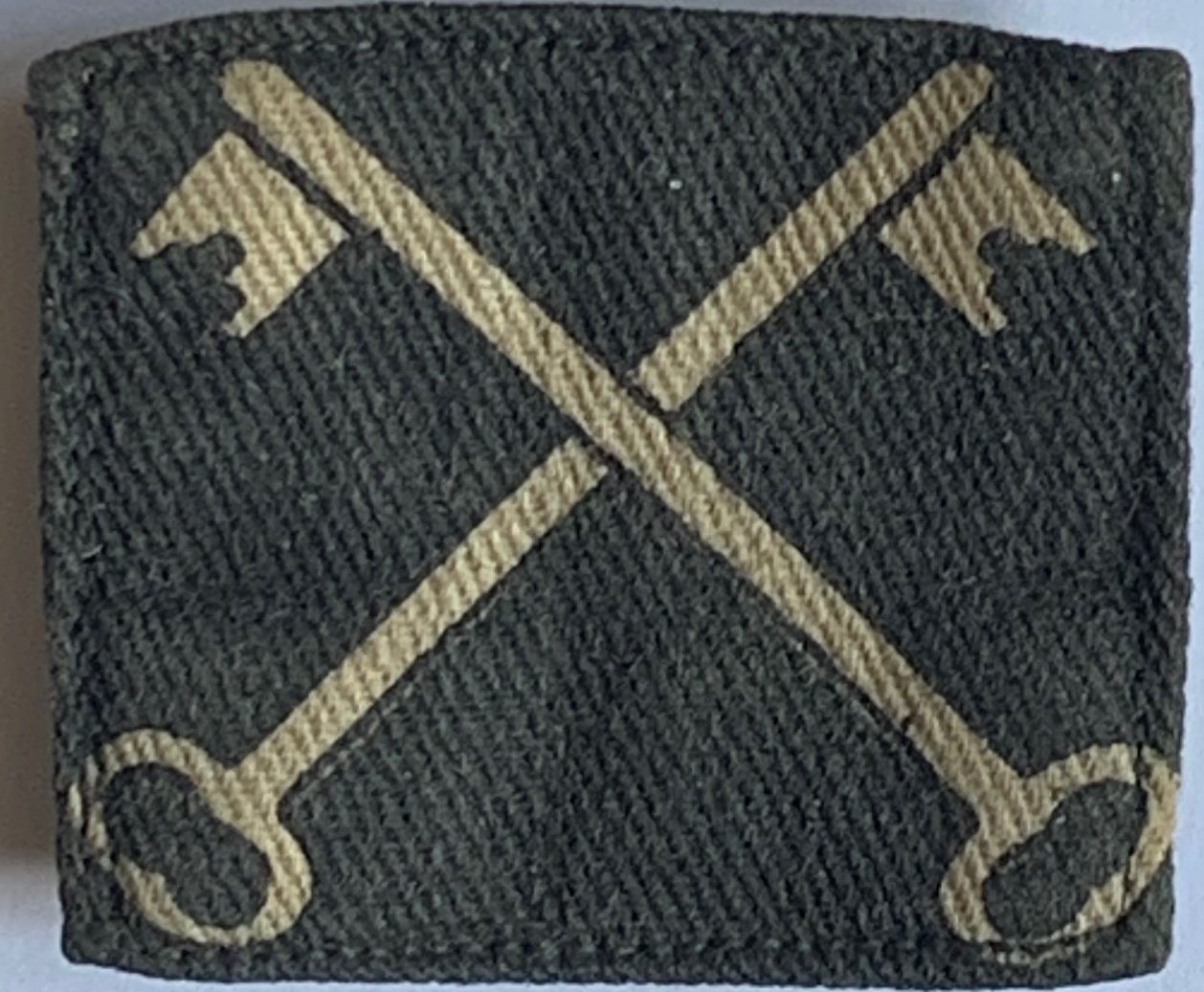THESE HANDS
Gunner Richard A George
99th (Royal Buckinghamshire Yeomanry) Field Regiment,
Royal Artillery, 2nd British Infantry Division
Beside the burnt-out remnants of this place
I saw the lifeless hands above the earth
Here then was war the horror of its face
For this, for this, a man was given birth
The shallow grave would scarce the body hide
Akimbo sprawled the hands were still and grey
I could not pass but knelt down by his side
To scrape the soil and cover from the day
These hands, I said, once moved and felt and knew
The warmth of other hands, and touched things dear,
Perhaps had picked firm fruit or flowers grew
Or turned bright wheels or trailed through water clear
But now no life beneath my burning touch
I tried to hide which might have been my own
Dead fingers here which once at life did clutch
But now I press them down, alone – alone
It seems so strange, the unexpected things
Which one is called to do in times like these
My mind revolves and childhood memory brings
The tears I shed, and know I cannot grieve, Only some deep-down pain I cannot show
Wells in my heart and floods without a sound
For this quiet heap where grasses soon will grow
For him who knows me not beneath this mound
* This poem was inspired by the death and burial of an unknown Royal Scots soldier during the Battle of Kohima. Gunner George says, “Some of their bodies had been hastily buried and it was over one of these graves I stumbled when we moved in later. The village was still burning, and I knelt and covered the exposed hands of the dead Scotsman in his shallow grave.” The poem was completed that same night.

TO JOHN ROSTRON DSO (Killed in Action)
Reverend Kenneth W. Parkhurst MBE HCF, Chaplain to 1st Battalion Royal Welch Fusiliers, 2nd British Infantry Division
They said you had gone but it didn’t seem true
I couldn’t believe it – it couldn’t be you
With your eager mind
And your humour gay
And your heart so kind
And your friendly way
I thought of the things you were planning to do and I couldn’t
believe it
No Johnny – not you
And I didn’t believe it was true, until
I saw the sun on a little green hill
And I thought of the downs that I knew far away
And remembering something I wanted to say
To you, because you’d know what I’d mean
And see exactly what I had seen
Something I wanted at once to share –
I turned to tell you – but you were not there
And then I knew that you had gone
And I was left to watch alone.
* Captain John Norfolk Rostron DSO, 1st Battalion, Royal
Welch Fusiliers, was killed in action on 22nd April 1944 and is
commemorated on the Rangoon Memorial. This indicates that his remains were not identified.

REFLECTIONS FROM KOHIMA 1944
Fusilier John Done
1st/8th Battalion, Lancashire Fusiliers,
Attached to 143 Special Service Company,
Headquarters 2nd British Infantry Division
Don’t stand and weep for me
I am the wind
I’m wild and free
I am the mist in the cold night air
I am the summertime warm and fair
I am the gentle autumn rain
I am the sun on the ripened grain
I’ll be there when you lie in your bed
I am the pillow where you lay your head
In a raging storm, I am the eye
I am a thousand birds that fly
Don’t stand and weep for me
I am the wind
I’m wild and free
Remember every word of love that I said
I am the vision at the foot of your bed
I am the stars that shine in the night
A beautiful eagle in the morning light
Don’t stand and weep for me
I am the wind
I’m wild and free

ALL RIGHT LADS
Private Raymond Street
Company runner,
4th Battalion, Queens Own Royal West Kent Regiment
Alright lads take him back
Down along that muddy track
Move it lads, the sergeant said,
Move it lads and help young Fred
Hot blue skies, hawk and kites
Not much like the Isle of Wight.
Alright lads, shells incoming
Watch it Bill, the mules are running
Shrapnel hits the Mango tree
Auntie Flo has come to tea
Alright lads let’s tend his wound,
Mother just arrived from Broome
Smoke is coming from the funnel
It’s getting dark, we’re in a tunnel
Alright lads let’s leave him be
It’s a wicked world
He’s all at sea.

MY DAD CRIED ON REMEMBRANCE
SUNDAY
Robert Street
Kohima Museum Trustee. Written in memory of his father Private Raymond Street, 4th Battalion Queens Own Royal West Kent Regiment.
He didn’t take long to prepare
A cup of tea, the TV, sat in his favourite chair
At 11, he stood to attention, straight and erect
It was his way of showing them respect
My Dad cried on Remembrance Sunday
Were they tears of joy; no
Tears of regret; maybe so
Tears of gratitude for he made it home
Tears of sorrow for those left buried alone
My Dad cried on Remembrance Sunday
It doesn’t take long to prepare
A cup of tea, the TV, sat in my favourite chair
At 11, I stand to attention, straight and erect
It’s my way of showing him respect
It’s my turn to cry on Remembrance Sunday
Are they tears of joy; no
Tears of regret; maybe so
Tears of gratitude for he made it home
Tears of sorrow for I now watch alone
It’s my turn to cry on Remembrance Sunday

The above poems are from the following book, which is available for purchase from the Kohima Museum.
 Like those of other formations, the men of the 2nd British Infantry Division (the Crossed Keys Div.) took pride in their achievements, which drove many to record their experiences in verse.
Like those of other formations, the men of the 2nd British Infantry Division (the Crossed Keys Div.) took pride in their achievements, which drove many to record their experiences in verse.
This volume of 132 poems has been compiled for the most part from the content of memorabilia donated to the Kohima Museum by veterans, and in some cases their descendants, of the 2nd Division, written before, during and after the Battle of Kohima. Each one reflects the feelings of the soldiers as they at times struggled to come to terms with the slaughter, chaos and mayhem that would have ensued after the kind of savage hand-to-hand fighting that was a common aspect of combat against the ferocious Japanese soldier. Some poems have been written by young men who fell in service to their country so far from home and whose remains lie forever in a foreign land, to be remembered with honour in perpetuity.
Other poems have been written by old men who survived the maelstrom of war and who took up the pen to clear their minds of the memories that flood back in their twilight years, but they were young once.
Wikipedia defines a ‘War Poet’ as a poet who participates in a war and writes about his experiences, or a non-combatant who writes poems about war.
None of the men who wrote the poems in this book could be classed as well known in the sense of Sasson, Owen or Brooke from WW1. In fact those men were already poets but who also happened to be soldiers because of the war.
The poems in this book were written by ordinary men who, in the main, were soldiers of the British 2nd Infantry Division. But for the war, they may never have donned a uniform. As part of the 2nd Division, they went to stand firm against an implacable foe in the most difficult terrain, enduring the most dreadful weather conditions; they wrote about their experiences either at the time or in later life. And in so doing they earned for themselves the right to be referred to as Soldier Poets.
For the purist, many of these poems would not be considered poems at all but merely ‘doggerel’ or at best, verse. But to the men who wrote them, they represented the honour and respect in memory of their mates who fell beside them in the vicious hand to hand combat, or who were blown to bloody pieces by the bomb and grenade, during the fighting at Kohima and in Burma.
If you would like to buy a copy of this book for a discounted price of just £13.50 Incl P&P, just contact us
